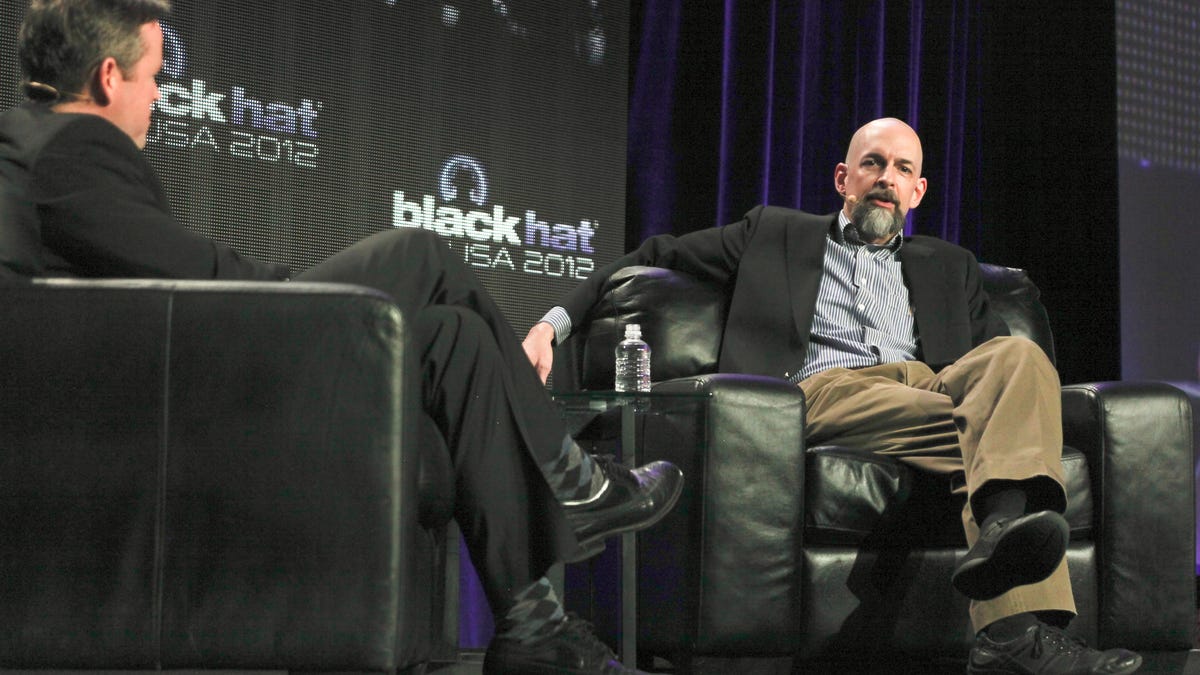Pen and sword equally mighty for science fiction's Stephenson
Futurist author Neal Stephenson regaled a bleary-eyed but enthusiastic Black Hat crowd with behind-the-scenes tales of baking science into his fiction and the struggles in creating a first-person video game sword-fighting system.

LAS VEGAS -- It's been a double-whammy of stardom for the attendees of the 15th annual Black Hat USA conference. Many people here suffered a line more commonly associated with Comic-Con or CES to get into an exclusive performance by electronica and trance legend Paul Oakenfeld at Club PURE last night.
And then this morning, they rubbed the hangover from their eyes and the ringing from their ears to listen to an on-stage conversation with noted science fiction author Neal Stephenson in the Caesar's Palace convention center.
Stephenson spoke for almost an hour with Brian Krebs, the investigative journalist who writes about security. While they ranged from his childhood influences to his books to his non-writing projects, Stephenson's face lit up as they discussed his recent Kickstarter project, "Clang."
"The level of technical detail in [first-person] shooters is out of control," he said. "I can still remember the first shooter I played when the game actually kept track of how many rounds I had left in my magazine. I was a bit offended by that," he said, as the crowd erupted in laughter. "I didn't want to think about that! I just wanted to hold the trigger down forever."
Clang is a project that aims to take what Stephenson describes as a growing interest in historical Western martial arts, specifically different forms of sword-fighting, and gameify them. Clang beat its goal of raising more than $500,000.
When Krebs said that he was originally surprised to learn that many DefCon regulars were also gun aficionados, Stephenson said that while he likes guns, they don't hold the appeal of finely honed steel. "I don't geek out on firearms the way I do on swords. Using [guns] seems like an inordinately inefficient way to make holes in pieces of paper," he smirked to more laughter from the crowd -- some of whom were definitely the kind of DefCon regular that surprised Krebs.
Stephenson's writing also figured large into the conversation, especially his research process when preparing to write a book. "I'm almost a little ashamed to call it research," he admitted, "since it's not what real researchers do. It's this sleazy process of skimming through a book and cherry-picking things -- [then] I change all the details."
One example he gave of this was how he applied the case of the infamous I Love You virus to a modern massively multiplayer online role-playing game (MMORPG) in his most recent novel, "Reamde." Other times, he said, he envisions scenarios that we all dream of, such as the character Ivanov in "Reamde" who has enough money to seek revenge on the virus writers who hurt his business.
A strong interest in the nature of how to communicate by code also fuels his imagination, Stephenson said. "I've been a little code geek since i was a kid. I had followed the story of the Enigma, the code-breaking at Bletchley Park, and in the '90s I became acquainted with a few of the people in the cypherpunk world. I thought of a way to make them heroes in a book, since they really were heroes in World War II."
Stephenson also discussed the darkening of science fiction, from its optimistic Golden Age roots. "The space program has tanked. The cars look different, but they're still cars," he said, explaining that except in biology and computers, there hasn't been much in the way of technological innovation in recent decades.
He then raised two questions. "Is there a correlation between the darkening of science fiction and a technological slowdown? And if there's a correlation, which way does the arrow point?"
"There's some reason to suggest that it points from science fiction into the world of technology. If all of our depictions of the future are incredibly depressing, then we don't have an incentive to build the future."

